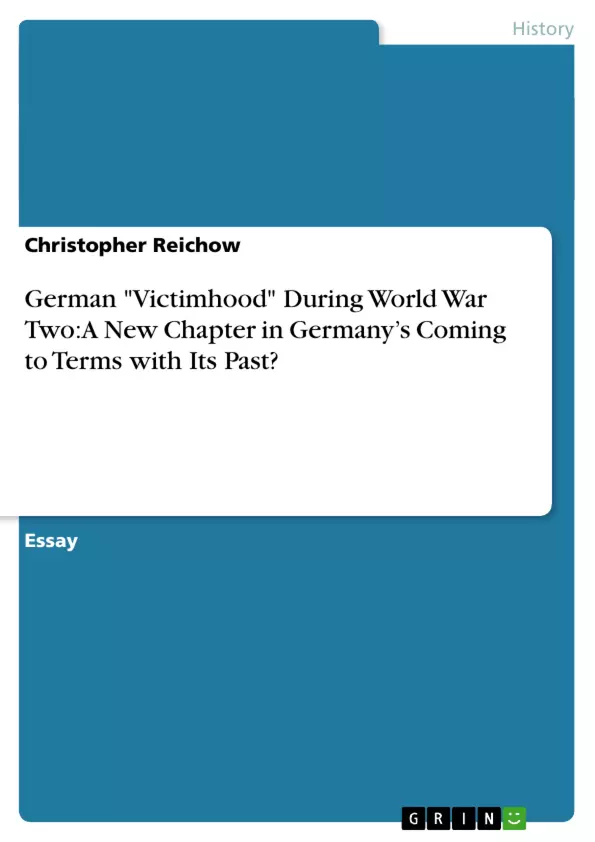The Second World War and its historical categorization remains a disputed topic within the German society. Still, the way of how Germans are rethinking their history is in a state of flux. While the question of collective and individual German guilt has attracted increased scientific and popular attention since the late 1960s, more precisely after the Eichmann and Auschwitz trials, German intellectuals and the German media have in recent years turned their attention, again, towards German suffering during the war. This can be seen as a recourse within a new framework. Already in the immediate postwar period, Germans depicted themselves as victims of the war and its settlement. The preferred self-image was that of being first a victim of Hitler’s and then of enemies hands. Once again, though very late, Germans today consider their own countrymen as victims. In movies and books, they depict themselves and their ancestors not only as villains, but also as people who endured air bombing, starvation, and expulsion.
This revived way of storytelling began around the new millennium and focused espe-cially on Germany’s civilian population. An important stimulus for Germany’s coming to terms with its past, or Vergangenheitsbewältigung, was once again triggered by Günter Grass, born in 1927 in Danzig, one of the country’s most popular and successful authors. Already as a member of the famous Group 47, he had – inter alia – initiated a new concept to rejuvenate German literature, particularly with his book The Tin Drum. He also contested a denial of civic responsibility and guilt in past and present, which he saw occurring in the consumerist-driven Bonn Republic. His first two books written in the new millennium, the novel Crab-walk, published in 2002, and his autobiographic work Peeling the Onion, released in 2006, were widely analyzed and sparked off a heated debate on both German guilt and German suffering. By using both books as a case study, this essay examines the main issues that were addressed by Grass and points out today’s situation of German Vergangenheitsbewältigung.
Inhaltsverzeichnis (Table of Contents)
- Crabwalk - Struggle backwards to move forward
- The Internet and the Rise of Neo-Nazi Propaganda
- The Role of the Gustloff in Shaping German Identity
- The Perils of Historical Revisionism
Zielsetzung und Themenschwerpunkte (Objectives and Key Themes)
This essay examines Günter Grass's novel Crabwalk (Im Krebsgang) to analyze the ways in which the Nazi past continues to influence Germany's present and its younger generations. It focuses on the complex interplay between German victimhood, the internet's role in spreading neo-Nazi propaganda, and the legacy of the sinking of the Wilhelm Gustloff.
- The impact of the Nazi past on contemporary German society
- The role of the internet in facilitating the spread of extremist ideologies
- The contested narrative of German victimhood and its connection to historical revisionism
- The significance of the Wilhelm Gustloff incident in shaping German national identity
- The challenges of coming to terms with a difficult past and the dangers of neglecting historical truth
Zusammenfassung der Kapitel (Chapter Summaries)
The novel Crabwalk delves into the complexities of German history through the story of the Pokriefe family. It uses the sinking of the Wilhelm Gustloff, a Nazi-era ship carrying thousands of refugees, as a central event to explore themes of generational trauma, the internet's role in spreading Nazi propaganda, and the pitfalls of historical revisionism.
The first chapter introduces Paul Pokriefe, a man haunted by his fatherless childhood and the legacy of the sinking of the Gustloff. It explores the psychological impact of growing up without a father and the complex relationship between Paul and his son Konny, a young man drawn to neo-Nazi ideologies. Paul's struggle to understand his own identity and his efforts to save his son from the grip of Nazi propaganda are central to the chapter's narrative.
The second chapter examines the internet's role in facilitating the spread of Nazi propaganda. It focuses on Konny's activities on a neo-Nazi website called blutzeuge.de, where he promotes conspiracy theories and incites hatred against Jews. Grass highlights the dangers of uncritical acceptance of online information and the ease with which historical narratives can be manipulated to serve extremist agendas.
The third chapter explores the complex relationship between the Gustloff incident and German national identity. It focuses on Tulla, Paul's mother, and her enduring grief over the sinking of the ship. Tulla's narrative underscores the enduring impact of the war on individuals and the potential for historical events to be used as justification for extremist ideologies.
The fourth chapter examines the dangers of historical revisionism, emphasizing the importance of confronting Germany's past and avoiding the temptation to rewrite history to serve political agendas. Grass highlights the role of education and critical thinking in preventing the resurgence of extremism and ensuring a responsible remembrance of the past.
Schlüsselwörter (Keywords)
The main keywords of this work include: German victimhood, historical revisionism, neo-Nazi propaganda, the internet, Wilhelm Gustloff, generational trauma, national identity, and the legacy of the Second World War.
- Quote paper
- Master of Arts Christopher Reichow (Author), 2013, German "Victimhood" During World War Two: A New Chapter in Germany’s Coming to Terms with Its Past?, Munich, GRIN Verlag, https://www.grin.com/document/273249



